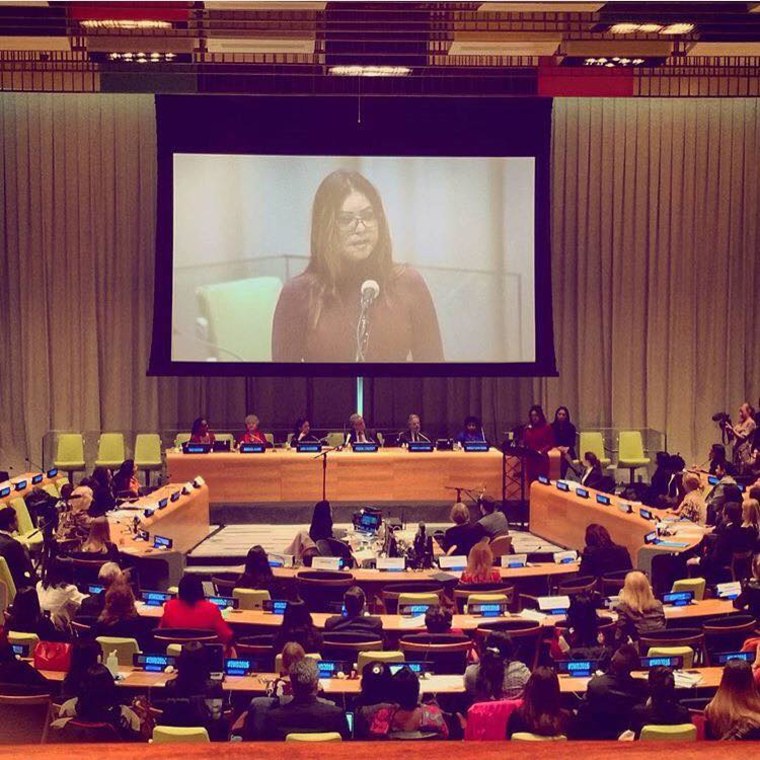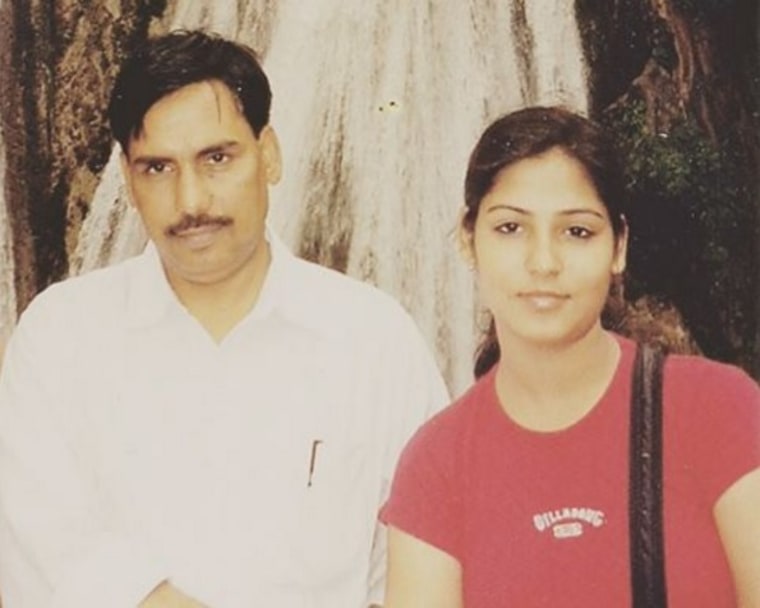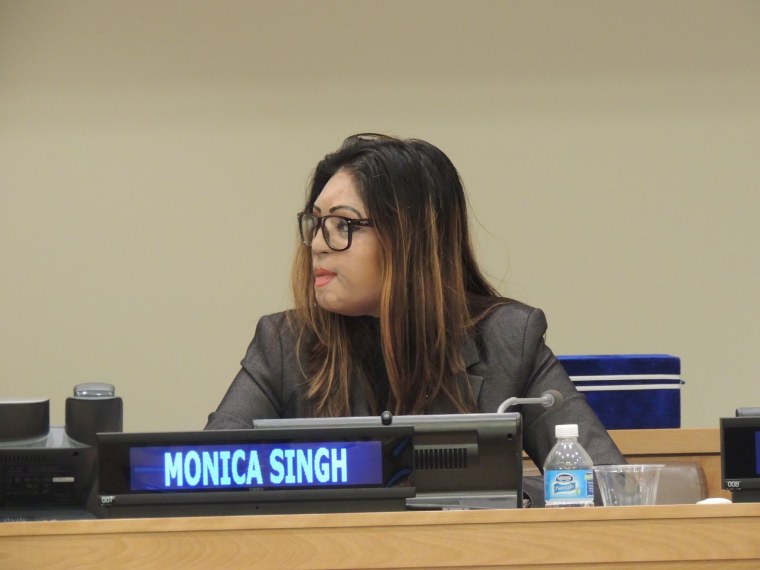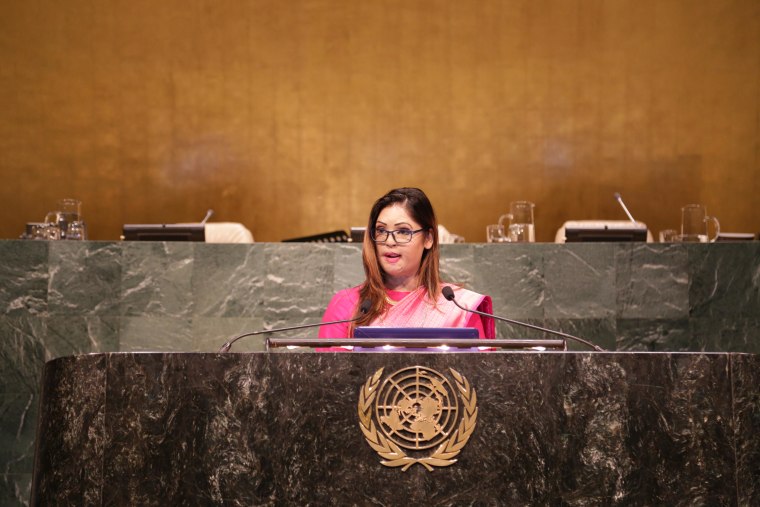Monica Singh doesn’t recognize the girl in her old family photographs.
“It’s difficult for any girl to see her face every day in the mirror all burned and scarred,” Singh told NBC News. “I know I was a girl who used to get worried if she got pimples or any mark on her face, and now her entire face is full of scars.”
For many years, those scars were a painful reminder of an acid attack that happened in Lucknow, India, in 2005, but today, the 30-year-old UN Women Global Youth Champion is speaking out against gender-based violence and using fashion to empower and encourage survivors to pursue their dreams.

Working in the fashion industry has always been a childhood dream for Singh. Growing up in New Delhi, India, she idolized fashion designers Valentino, Manish Arora, and Alexander McQueen and spent her time brainstorming new designs in her sketchpad and consuming the latest fashion news.
“I look at fashion as a confident tool…I want to define [myself] as a woman who can be what she wants to be if she decided with the purest heart. I’m trying to tell every girl who has gone through so much that, ‘yes, you can do it,’” Singh said.
Singh was a first-year student at the National Institute of Fashion Technology in New Delhi, studying fashion and apparel design when the acid attack happened.
During a week off from college, Singh decided to visit her parents in Lucknow. She said a friend that she had known for many years called her on the phone while she was driving and convinced her to roll down her car windows. When she did, a biker poured a bucket of acid on her. Singh said her legs became instantly numb and everything around her became hazy.
“I was suddenly screaming because I was feeling my body burning," Singh said. "It was a horrific moment.”
A passer-by helped her get to the nearest hospital, where she was admitted in critical condition with burns over nearly 65 percent of her body. In total, Singh underwent 46 surgeries in India over the span of ten years. She credits Dr. Vaibhav Khanna in Lucknow and doctors Sunil Chaudhary, Prateek Arora, and Raghav Mantri in New Delhi for saving her life. Singh said that while her will power kept her alive, during the months following the attack, she leaned heavily on her family.
“The girl who always wanted to do something amazing in a glamorous field initially she ... became a dependent for quite some time on family so that she could get fed,” Singh said.
RELATED: Oscar-Nominated Documentary Puts Pressure On Pakistan Over 'Honor Killings'
Dr. David H. Song, the vice chairman of University of Chicago Medicine’s department of surgery, has worked on more than 20 acid burn patients in the Dominican Republic and Honduras. Many of the acid attack survivors he has worked with have been victims of domestic violence, and in many cases, the perpetrator is someone the victim knows, he told NBC News.
“Unfortunately that is not a rare occurrence — it seems to be a common denominator … some sort of domestic dispute, whether it’s between a spouse, or a person that’s courting the woman or someone that’s jealous,” Song said.
In some of the more severe acid burn cases, patients can lose their eyesight and the ability to move, he added.
“I was suddenly screaming because I was feeling my body burning. It was a horrific moment.”
“When you see a burn of any sort, early skin grafting can mitigate long-term effects of these burns,” Song said. “I’ve seen the whole gamut of patients from early acute burns to late chronic burns when patients can’t turn heads.”
Though acid attacks are not as common in the U.S., Song said that global and social awareness for these injuries is important. While the survival rate for acid attack victims is high, the damaging physical and emotional effects leave long-lasting imprints.
“Most people don’t die of these injuries,” Song said. “Typically what the perpetrators do is splash or pour the acid over someone’s face…in many ways, it’s almost worse because it’s disfiguring the face, and injuries to the face can be devastating.”
Speaking Out Against Violence
Singh has always looked to education as a source of freedom, strength, and empowerment. One of her attacker’s motives, Singh said, was that she had declined his marriage proposal because she told him that she wanted to focus on her education and career.
“I chose I’m going to study, and I’m going to make myself strong enough so people can think that no matter what can happen, if you have will power, you can achieve what you want to,” said Singh, who completed her degree at the National Institute of Fashion Technology in 2009.
“I took education and made that part of my life stronger so that anybody who can think that my life has ended, they can say, ‘No. It’s not the end. This is only the beginning,’” she added.

But for many years, Singh became the girl who was told she was “no longer beautiful.” Many told her that she would probably not be able to pursue a career in fashion because of the scars on her face. But Singh refused to give up on her dreams, diving into the business and marketing aspects of fashion and landing an internship at Harper's Bazaar, where she worked with fashion designer Manish Arora — a childhood dream come true.
“I did the opposite — I stuck to the fashion world and learned, and did whatever I wanted to do. I still attended fashion shows,” she said.
RELATED: 'Abolitionista!': Fashion Show Benefits Anti-Child Trafficking Comics
Singh gradually regained her confidence and faith in humanity. Singh says she would often stare at her new face in the mirror to accept and embrace her new identity. She would also watch comedy sitcoms and movies while also immersing herself in her work.
“I believe if you [stare at] something so much, you end up losing interest in that,” she said. “So I saw my face so much, then I’m like, ‘okay, it’s just the same scars.’”
In March, Singh spoke at the United Nations headquarters in New York City, promoting gender equality and addressing the need to put an end to child marriage and violence against women.
“I was a victim, but I’m standing here to fight,” she said during her speech. “I’m standing here to raise the voice of all young women and girls who have been forced into marriage, who have been abused and raped.”

Singh hopes to carry that message of hope through the Mahendra Singh Foundation, which she co-founded with her brother Nikhil in 2015 and named after their late father. Singh credits her father as someone who had always helped others. He made sure that she received immediate treatment and did everything he could to ensure that she survived and was able to complete her education.
“I opened this foundation in his name because I believe that he saved my life. I have seen him helping so many people since I was young,” Singh said.
The Mahendra Singh Foundation provides services for acid attack survivors and hopes to expand services for survivors of sexual assault, rape, and domestic violence. Singh’s foundation currently collaborates with other organizations such as The Red Elephant Foundation and Make Love Not Scars.
Singh said many survivors of acid attacks are traumatized and do not have the resources or funds to undergo surgery, or they are in an unsupportive environment, which may cause them to halt or postpone their dreams. Singh hopes to collaborate with colleges and doctors who can provide counseling services or pro-bono medical care for acid attack survivors.
“I know that when I was a patient, there are a lot of things people don’t know about it,” Singh said. “They end up going to wrong places…key point is giving right knowledge and sending them to the right place.”

After the passing of her father in 2013, Singh wanted to keep his dream alive. She applied to several graduate schools and received an acceptance letter to Parsons School of Design, moving to New York City to study fashion marketing with the help of a crowdfunding campaign. In May 2016, she will officially graduate. It’s a day she wished her father could have lived to see.
When Singh looks at the mirror today, the woman staring back at her is no longer a stranger. She is comfortable and confident in her own skin as she looks beyond the imperfections on her face.
“I see this woman who is really focused, very strong, and her heart is changing toward more love now,” Singh said. “She is moving on in life but also trying to build other peoples’ lives. She is doing something which she never thought she would do.”
Follow NBC Asian America on Facebook, Twitter, Instagram, and Tumblr.
